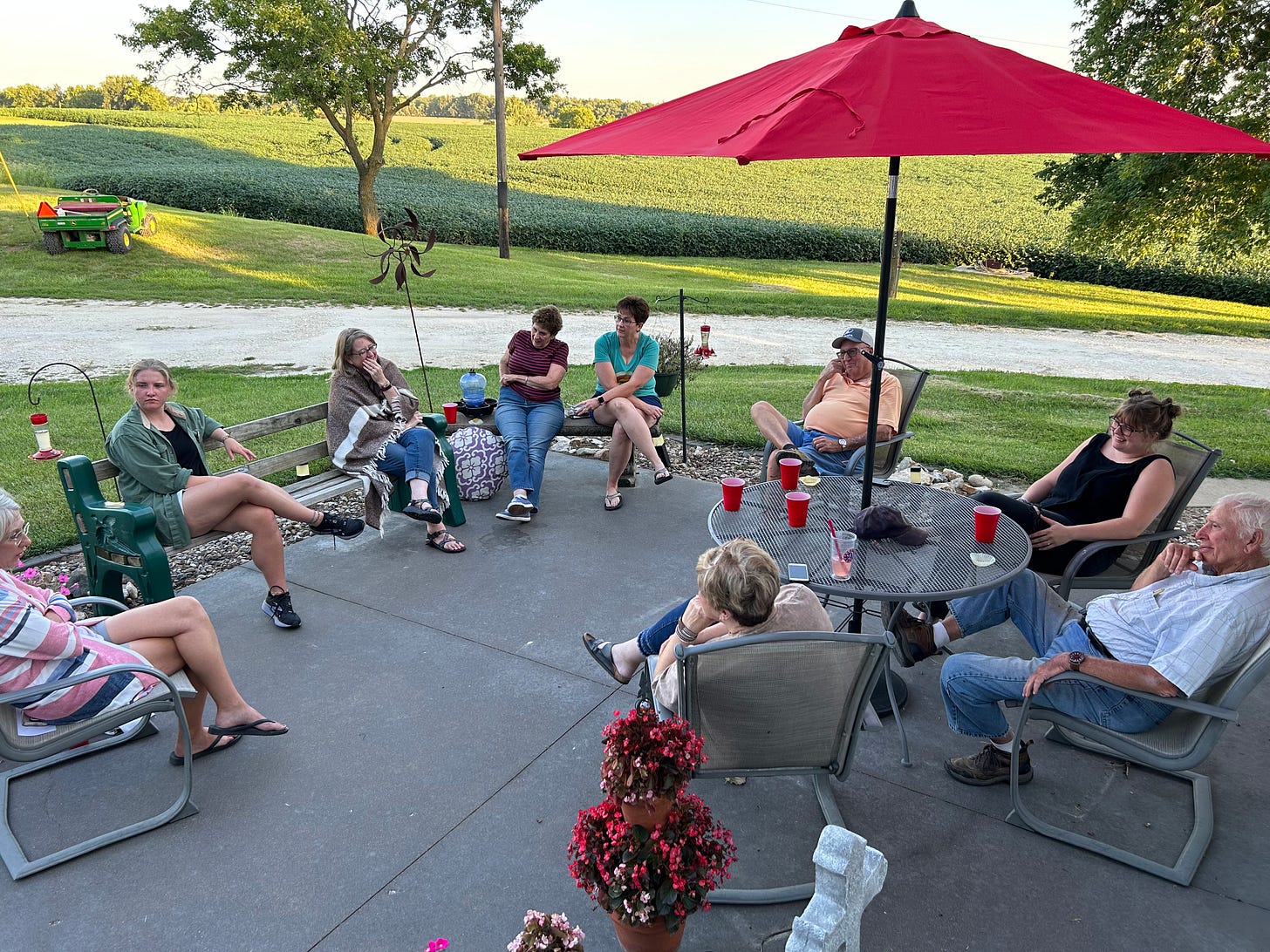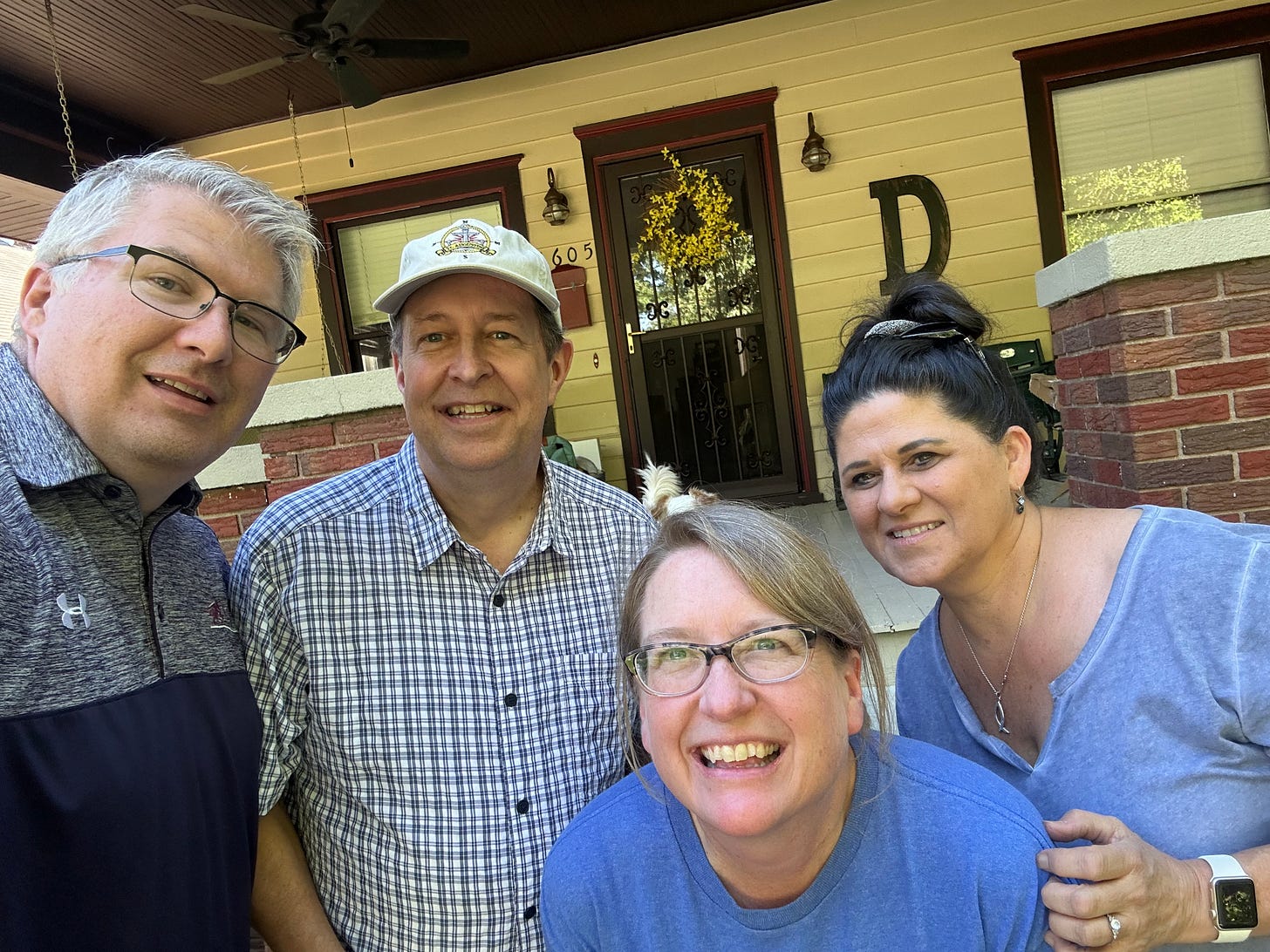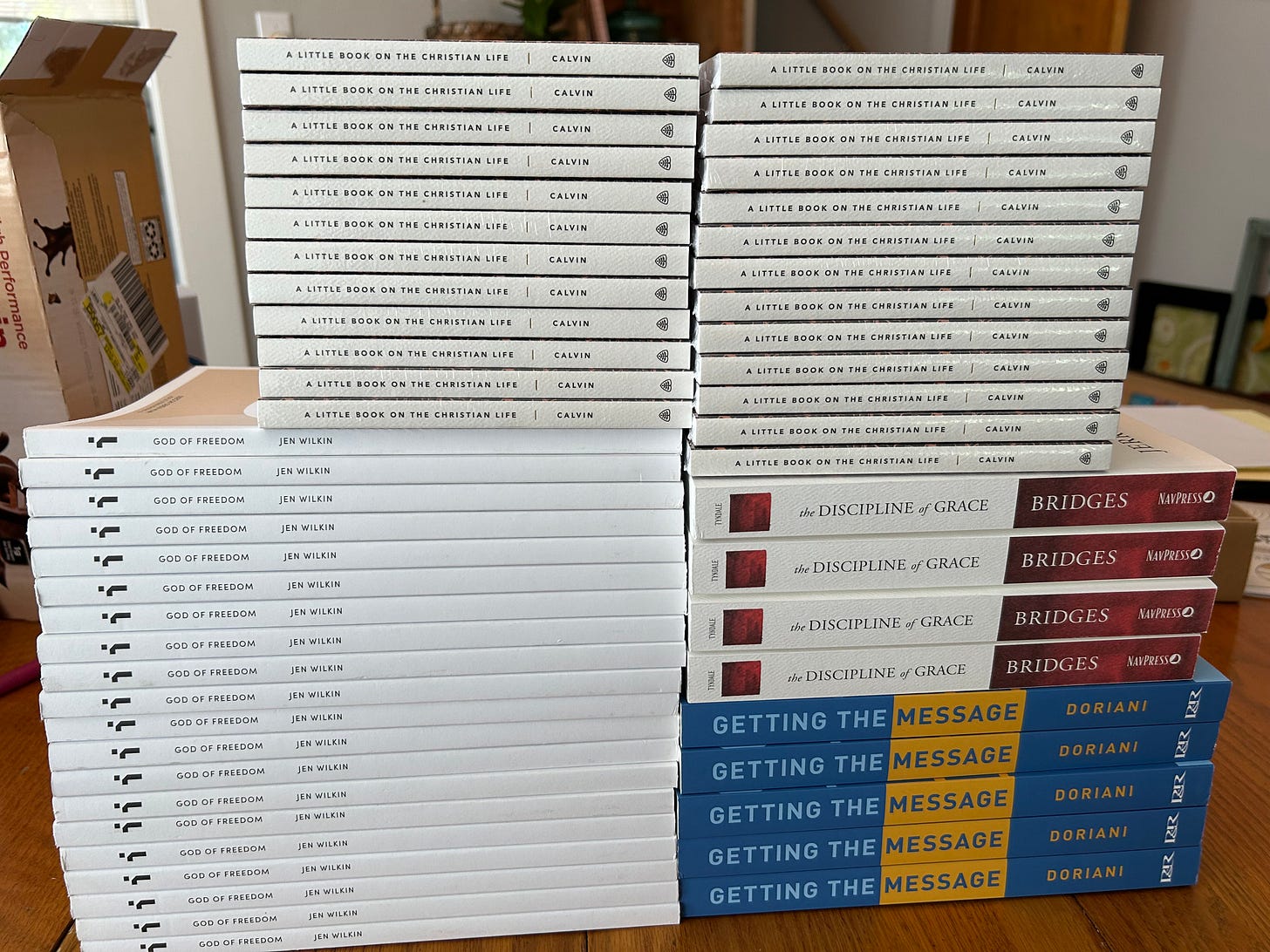Dear Friends,
Welcome to Labor Day Weekend! Before you head out to do what you have planned to commemorate the traditional end of summer, I thought I’d get you our September update in case you need some weekend reading material. But first, here are a few photos from August:



Judging by the lower readership numbers (539 views for August’s “Wind, Swells & Waves” post compared to 860 views for Megan’s post in July), the topic of religious liberty in Illinois didn’t seem to scratch too many itches. And I get it: it was a hot August, folks were coming to grips with squeezing in vacations and getting ready for school, and let’s face it, Taylor Swift and the Barbie movie were much more entertaining, I’m sure. No harm, no foul.
I did get an email from a Chicagoland friend who shared a few observations in response to what I wrote. Regarding the State of Illinois and its religious freedoms, his take was this:
“Outside of agreeing that I wish I could pay a bit less in property taxes, I don’t find it nearly as bad as those downstaters you found seem to make it! I can’t vouch for the entire state, but at least around here, that religious freedom seems to ring true. Lots of churches of all kinds in the area (a brand-new mosque is going in just a couple miles up the road), and pretty much the sense I get is live and let live. There is actually a substantial Indian/Middle Eastern population around here, to the point where most of the choirs at [our school] are probably on average about 30-40% Indian, so it’s pretty common to have various Hindu and Muslim mosques and temples around, and with extremely rare exceptions, I’ve seen hardly any public antisemitism, anti-Muslim, etc.
I think the one area where I probably see the most push back is when it comes to if one particular religious group wanted their beliefs imposed on the masses, but outside of that, people tend to leave each other alone when it comes to religious expression. There are Christian displays at Christmastime, Jewish displays, Diwali, and acknowledgments of Ramadan, all co-existing pretty well.”
While I don’t deny his experience and observations, it doesn’t fully take into consideration the secular humanism some businesses and government seek to impose in vocational spheres to which neither he nor I belong. As I wrote at the end of last month’s post,
“As a native son returning to his homeland, I’m surprised Illinois looks as good as it does on paper and (presumably) in the court room. But talk to a person of faith (particularly the Christian faith) involved in the sectors of technology, medicine, law, education, and government in Illinois, and they’ll tell you all bets are off as to whether legal protections will stand when the blowing cultural winds turn into churning swells that turn into bigger waves and further erode the Land of Lincoln.”
I know firsthand people who love and care well for those with whom they work, but who daily wonder what implications might be as they refuse to wear the “Ally” T-shirt handed out by their employer, or forget to self-censor their speech and say something that will get them fired. “Belief imposing” goes on in Illinois; it’s just by hands of a different organized “religion.”
With regard to the newsletter, not everything is going to be everyone’s favorite, and that’s okay. I’ll keep writing, and you let me know if there’s something you’d like to read more (or less) about. In the meantime, have a nice weekend, and thanks as always for reading Second Drafts.
Craig (for Megan)
Hot Takes
By request, I’m bringing back the old “Hot Takes” section when something interesting strikes me (though I might rename it this month to “Lukewarm Takes Due to Moving This Summer” since these are hardly breaking news stories). A few notes:
On “Rich Men North of Richmond”
A couple of readers asked for my take on Oliver Anthony’s song, “Rich Men North of Richmond.” If you’ve not yet heard the song, it’s a good tune and worth a listen.
The song shot up to number one (whatever that means—does anyone even buy music anymore?)—but brought along with it plenty of people and politicos trying to make it mean what they wanted it to mean. Sure enough, everyone got it wrong, but journalist Rod Dreher comes closest in putting into words my thoughts. An excerpt:
“I think it is so very telling that both the right-wing and the left-wing partisans immediately seized upon the song to claim it, or vilify it, based on their own knee-jerk interpretations—interpretations that are not borne out by an honest reading of the song’s lyrics (which The Free Press story explains). What a sad story that tells about where we are in America. It tells us that we are incapable of listening to each other, of hearing anything that fails to conform entirely with our own preferred narratives. It is simply impossible that someone with whom we might otherwise sympathize has something critical to tell us about ourselves—and that we should listen, because we might learn something.”
Musically, Anthony (real name: Chris Lunsford) has a powerful voice, his dobro playing is “dobro” enough, and “Rich Men North of Richmond” is a whole heck of a lot better of a song than Jason Aldean’s recent (and godawful) “Try That in a Small Town.” But while there are some clever lyrics and turns of phrase, his lyrics to other songs leave something to be desired. Yes, they’re raw and that’s part of their appeal (and, full disclosure, at least in “Richmond,” I find no lies detected), but I don’t see people listening to this song 30 years from now like someone might pull up this John Mellencamp anthem, which makes use of more timeless imagery than timely jabs.
As for Anthony, I feel for him being thrust into the limelight so harshly, but he seems to be handling it pretty well (this interview clip with Joe Rogan is very grounded). Will he stay independent and resist those who come courting musically or politically? And in what kind of soil will the seeds of his recent conversion grow? While I wish him the best, I wonder if his 15 minutes of fame are almost up, as I don’t think he’s a strong enough writer to keep people’s attention for too much longer. Songwriting is hard.
On The Sound of Freedom
I only made it to the theater twice this summer: once to see Indiana Jones and the Dial of Destiny (a sadly mediocre end to the franchise that seems already forgotten in the annals of time), and once to see The Sound of Freedom, a film exposing the absolute evil of child sex trafficking in the world. Here’s the official trailer:
Believe me when I tell you that I hate going to movies like The Sound of Freedom, not because of seeing children suffer on screen (it’s a movie; there are production rules), but because I know that the child trafficking portrayed in the film is really going on all over the world, including Springfield, IL, and those children are at the mercy of some of the most evil people on the planet who don’t play by any rules.
Almost worse than knowing that The Sound of Freedom was not entirely fiction was wading through the swamp of media sabotage claiming it was not worth watching. Whether the attacks were from Hollywood, who tried to tie the film to QAnon as punishment for making an end run around the studio system, or Washington, D.C. who would have preferred the movie not keep child trafficking in the public eye (anyone seen Jeffrey Epstein’s list yet?), or from Christians refusing to see it because it was produced by Angel Studios, a Mormon distribution company (yes, Mormonism is not Christianity, but surely we can come together on behalf of sex trafficked kids), it’s a borderline miracle the film even made it to theaters, let alone did well ($165 million).
The actual movie? It wasn’t perfect, but it was powerful. Actor Jim Caviezel (The Passion of the Christ, The Count of Monte Cristo) led a talented cast (especially the kids), and any adult who loves children should still go see it and learn and do whatever is in your power to bring hope and help to the situation. God, have mercy on our world.
Training Ourselves to Be Godly
I couldn’t figure it out at first.
Twenty yards ahead and to the right were two men—one tying a three-foot long piece of white rope around his wrist; one holding the other end untied in his hand—both sweating profusely as they stood alongside the pedestrian trail in Washington Park.
As we kept walking and got closer—Peaches on her end of the leash; me with the other end in my hand—I couldn’t help but smile at the similarities of the situation. Why were these guys walking each other? And while we were at it, which of us—Peaches or me—was really walking whom?

We kept walking and pulled almost even with where the men were standing when the first man, having finished tying a knot, looked up and nodded at the man holding the other end. Turning and ensuring the path was clear, the second man began walking until the slender white rope between them gently tightened, at which point the first man immediately started jogging next to him.
I got it then: the first man was visually impaired; the second man was his guide.
I stopped in my tracks (as then did Peaches) to pull out my phone and snap a photo of this beautiful picture of discipleship. Unfortunately, I didn’t make it in time, as the men were already far enough down the path that a cell phone photo wouldn’t have done them justice. For the briefest of moments I thought about catching up to them to capture or even stage a shot, but I didn’t want to be rude and ruin the moment of watching one person lovingly helping another who trusted him to go somewhere.
Neither man was in especially great shape; true, the man holding the rope could obviously see better, but who knows if he would have even been out running if the man with the rope tied to his wrist hadn’t needed him? It seemed a mutually beneficial arrangement, and I was grateful God had showed it to me that morning.
Disciples or Mentors?
It’s not easy to initiate or establish such an interdependent relationship, especially in a world that preaches a gospel of fierce independence and general omnicompetence. But the truth is, all of us need help, especially the “spiritual” kind, and it’s to our peril to ignore this reality, since our hearts can be as blind as our eyes…sometimes more so.
I hesitate emphasizing the need for “spiritual” help (as if one can easily separate the spiritual from the physical in our humanity), but modernism’s past 300 years have created a false dichotomy that compels me to acknowledge the division even as I push back against it. Author Karen Swallow Prior talks of how influenced we’ve become by modernity’s confusion of man as machine in her new book, The Evangelical Imagination: How Stories, Images, and Metaphors Created a Culture in Crisis:
“An everyday example of how this Enlightenment-era machine metaphor persists comes from a friend who has a daughter with Down syndrome. My friend heard someone observe that a classmate was ‘low-functioning’ in comparison to my friend’s child. This well-intentioned comment made my friend realize that talking about any person’s abilities in terms of ‘functions’ is dehumanizing because it ‘serves to compare them to a machine.’ When we use language such as ‘functioning’ to describe human beings, my friend wrote, ‘we play into the dehumanizing rhetoric of modernity.’ We treat ourselves, as Abraham Joshua Heschel writes, as if we were ‘created in the likeness of a machine rather than in the likeness of God.’” (pages 19-20)
All that to say, physical man needs spiritual help, but many of us have convinced ourselves (and others) that we’re not all that impaired, nor do we have actual cores, corners, or edges of our character that might need re-forming.
Perhaps worse, we’ve softened the language and mindset of “discipleship” that this re-forming used to require (think “iron sharpening iron” and “one man sharpening another” from Proverbs 27:17), replacing it with the softer concept of “mentorship.”
Here’s a definition from one of the first books (circa early 1990s) I recall reading with the term:
“Mentoring is a relational experience through which one person empowers another by sharing God-given resources.”
There’s nothing inherently wrong with this definition, nor the act it defines; it just seems overly clean, clinical, and well, modern (yes, I know about Mentor and who he was). If we were to paraphrase Proverbs 27:17 in this same vernacular, we would need to use softer metals and verbs to match its tone: “aluminum reflecting aluminum” and “one man reflecting another,” or “tin bending tin” and “one man bending each other.”
From my perspective, iron-sharpening-iron discipleship speaks to a need for formation/re-formation, whereas mentorship (which can be part of the discipleship process) seems to allude to an option for consultation/counsel. Call it splitting hairs if you want (and feel free to drop the distinction if it doesn’t help at all), but remember that Jesus’ Great Commission was to go and “make disciples,” not “be mentors.” They are not the same. Discipleship (a la Proverbs 27:17) requires real skin in the game.
What Sharpening One Another Might Look Like
If you think about it, discipleship—helping someone mature in his or her followership—happens all the time and in many contexts. For example, people are “discipled” to become Republicans, Democrats, or (sadly) even Chicago Cubs fans. This is because, as creatures made to worship God, each of us is hard-wired to want to “follow” someone or something. If we’re not careful (or more accurately, not “intentional”) as to whom we follow, that someone or something may end up being only ourselves and what we want.
True Christian discipleship involves Scripture and its presentation of the person of Jesus, who was and is the Living Word—the “logos”—of God. This doesn’t mean other books or content can’t be part of our discipleship, but the Bible has to be; disciples for Christ cannot be made without the words and work of Christ to form them.
With this in mind, let’s revisit our runners in Washington Park. As earlier described, the two showed up at the same time and place, tied themselves to one another, and ran to get somewhere. With only one important element missing (which I’ll talk about in the last section), here’s how their example can model Christ-centered discipleship.
Showing Up (shared desire)
Disciples follow, following requires taking steps, and taking steps means something has to motivate us (just like something motivated our running friends). Ideally, this “something” is a positive call or pull (Jesus’ invitation to “Come, follow me,” our love for God because of his love for us, an opportunity to grow in faith and godliness, etc.) rather than a negative one (guilt, peer pressure (yes, even as grown adults), self-protection against looking or doing something stupid).
In reality, our motivation for discipleship will probably be a combination of the two; the key is to find someone else (or an entire group of someone elses) with similar desires and motives (mixed as they might be) to “tie ourselves together” to for a time. As a former pastor of mine used to say, “We’re all beggars showing each other where to find bread.” These are our people—hungry, willing to lead or be led to the “goods.”
Time and Place (logistics)
Like the two guys meeting up in the park, there has to be an agreed upon time and place to meet. I know this seems elementary, but “fail to plan, plan to fail,” etc.
My friend, Artie, and I live three streets over from one another and have determined that we’re going to get together one morning a week (we’re still determining the best day and time) for “porch time” to talk about the relationship between justification and sanctification and how we see it working out (or not working out) in our lives. Also a stated part of the deal: whoever hosts provides tasty beverages.
Commitment to the Process (togetherness)
Unless you’re still stuck in 2020 or halfway around the world from one another, it’s always best to meet in person and face-to-face. In addition (and this is important), as you tie a figuratively binding rope around each others’ wrists as to your commitment to get and go together, be honest and realistic about the getting and the going.
Depending on what you’re wanting to study or do together, getting together once a week for 4-6 weeks may be a good initial run; for studying something more involved, 10-12 weeks is plenty of commitment to make. Whatever length of time you decide, make it a priority not to miss. At the end of the window, if it seems good to re-up, do so for another allotted (and committed) time period; if not, step out and go in peace.
Deal with an Obstacle (goal)
Determining what needs sharpening is always tricky, but if there’s any comfort I would offer (and regardless of whether you walk through a companion book or guide as part of any study), it’s this: if you’re reading the Bible, you can’t go wrong.
When I was in college, a man named Larry and I met once a week for two-and-a-half years to read the Bible (mostly the Gospels and Epistles), review and memorize Scripture, and pray. That’s really all we did (though he helped me with a whole lot more), but that was all we needed to do. As Hebrews 4:12 says,
“For the word of God is living and active, sharper than any two-edged sword, piercing to the division of soul and of spirit, of joints and of marrow, and discerning the thoughts and intentions of the heart.”
We didn’t lack for something to talk about as we read the Scriptures because we let the Scriptures read us. As Dr. Dan Doriani, one of my favorite seminary professors and author of many books including, Getting the Message: A Plan for Interpreting and Applying the Bible, later helped me understand,
“The key question of hermeneutics [interpretation] is NOT, “What does this text say to me?” but “What does this text say for me, or even against me—against my prejudices and preconceptions? What does it say, not strictly to me, but to everyone who diligently observes its every word?” (p. 27)
With these questions in mind and a willingness to be both intellectually and emotionally honest, you’ll be well on your way to having plenty to discuss together.
(Note: I highly recommend Dan’s book to come closer to the world of the Bible, to avoid moralistic proof-texting, and to help respond rightly and biblically in life’s situations. His essay, “Applying Scripture,” would also be an excellent read if/as you and others engage the Bible this fall.)
Go Somewhere (growth and obedience)
I won’t pretend to know what the goals of the two runners who Peaches and I saw in Washington Park were; maybe they didn’t have any more complicated than just to run, enjoy the outdoors and their time together, and get a little exercise. And that’s great.
But Jesus does have a goal for our discipleship, namely that we would grow to obey everything he has commanded us (see Matthew 28:20), which fills no small syllabus, particularly when we know he’s concerned with how and why we obey, too.
The point is this: there is purpose to the sanctification process, and in many ways, the sanctification purpose is the process (or at least a large part of it). As Jerry Bridges writes in The Discipline of Grace,
“Sanctification is the work of the Holy Spirit in us whereby our inner being is progressively changed, freeing us more and more from sinful traits and developing within us over time the virtues of Christlike character. However, though sanctification is the work of the Holy Spirit in us, it does involve our wholehearted response in obedience and the regular use of the spiritual disciplines that are instruments of sanctification.” (p. 94)
In other words (and as Paul encouraged Timothy in the latter part of 1 Timothy 4:7),
“Train yourself to be godly.”
The Missing Element: Church
The responsibility to train is ours, but not ours alone (or even with just one other person). As helpful as I hope it’s been, the metaphor of our two running guys tied together breaks down if we let them just run off into Washington Park on their own.
That’s because Jesus’ Great Commission and Paul’s admonition (and frankly anything else you’ll ever read in the Scriptures and along with the Holy Spirit’s work) ultimately has everything to do with building Christ’s Church. Discipleship, then, is a means, not an end. The better (and biblical) end can be found in Colossians 1:28, which says,
“Him we proclaim, warning everyone and teaching everyone with all wisdom, that we may present everyone mature in Christ.”
Who is “we” in this passage? “We” are the Apostles, whom Jesus appointed to lead the Church he is building and to whom he gave its kingdom keys (see Matthew 16:18). And what is the goal of the Church? To proclaim Christ, so as to one day present everyone mature in Jesus (which should answer why, if your pastor preaches from the Scripture, his Sunday morning sermon is and should be worth your time).
Jesus’ command to “follow me” was the call to follow him as part of his Church being built, not apart from it. The Church is Christ’s Body, marked by the true preaching of the Word and the proper observance of the sacraments. This post is too long to go into what all that means, but a valuable benefit of being part of Christ’s Body is the nurture it can provide. As Edmund Clowney writes in The Church,
“While the church cannot be defined in terms of nurture alone, it cannot be understood without it: God the Father instructs and trains his children; Christ teaches his disciples, and the Spirit equips the saints to serve the nurture of the body.” (p. 138)
Toward the goals of maturity and nurture, local expressions of the Body of Christ should provide maturing and nurturing discipleship offerings and relationships. For example, below are write-ups and details for Exodus Church’s fall discipleship offerings. We’re asking each adult member to consider committing to one study in addition to faithful Sunday worship, and pray that whatever he or she chooses will nurture his or her soul.
What About You?
If you’ve made it this far, you deserve an award. But rather than send you a cheap participation trophy, let me offer you one last bit of discipleship encouragement: pursue it.
If you’re a Christian, find some “runners” in your church, tie yourself to each other, and go. Look especially for those who are hungry and see where the Lord might take you to and through his Word. Who knows? Growth and maturity might be just around the corner.
If you’re a skeptic, find a symposium like the one I’ll be teaching this fall (see the brochure above) and choose to be a part. Don’t just write Jesus off, even though I and plenty of others have probably given you reasons to do so. Is he really who you think he is?
I’d love to hear from you as to what discipleship opportunities you might be pursuing this fall. Please email me, send me links, or just tell me what you have planned. If you have questions about what might be a good next step, resource, or study to consider, I’m glad to think with you. If nothing else, I’d be glad to pray for you as you start this next season.
That said, thanks for reading, and if you find some bread, be sure to tell the rest of us!
Until next month.
Picture of the Month

Thanks for considering becoming part of our support team (all gifts tax-deductible).
Know someone who may be interested in our ministry in Springfield? Let them know.




